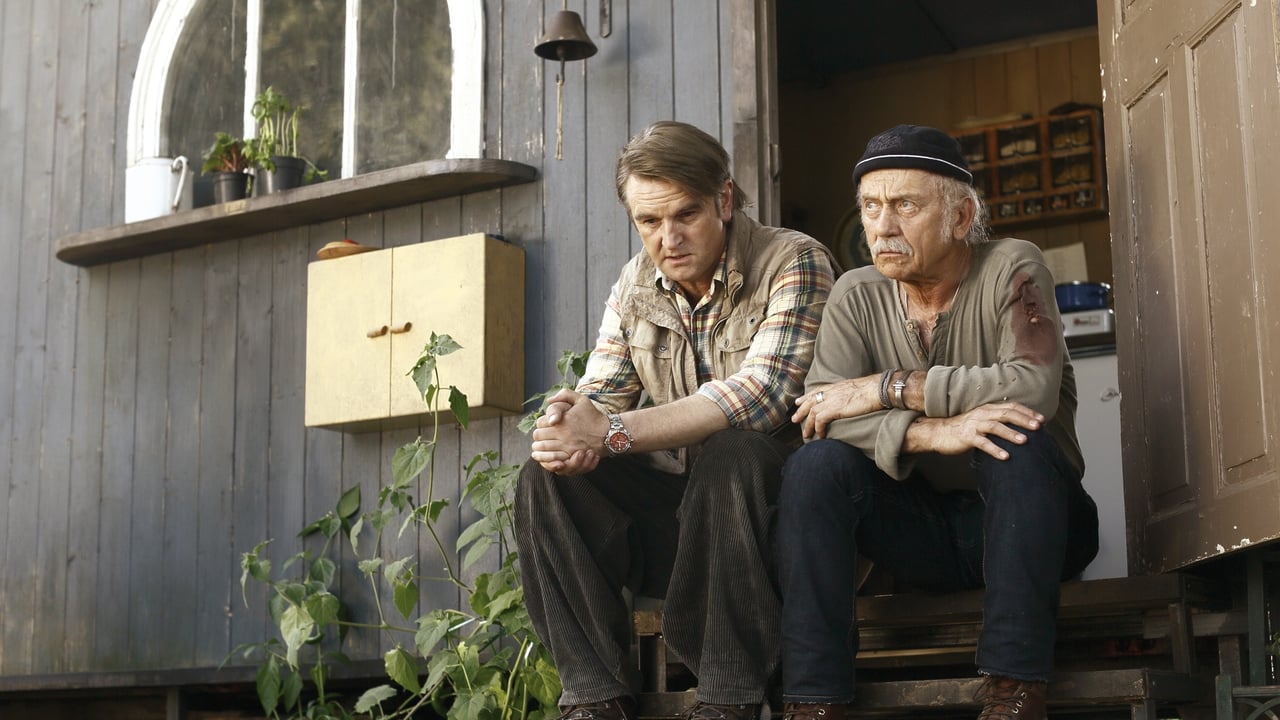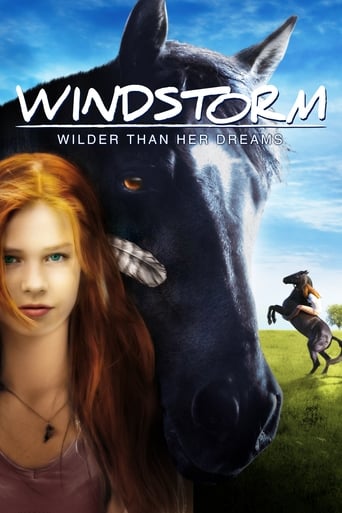

Mika is bad at school (normal life), but is good with the wild horse. I liked instantly the concept, I understood this will be a tale about talent. Mika breaks every rule she finds and yet nothing happens, apart from she finds her way. Her way that is also the way of the other "outsider" (the horse). They make "career" together, and Oma should accept them together. She can be proud of them. Even if she did not do anything really to any of them, just the opportunity to meet. While watching this movie, I had nearly constant smile on my face, this is the kind of film that gives you hope and inspiration to follow your dreams.
... View More"Ostwind" is a German 2013 film that runs for 100 minutes without credits. Children's films are fairly popular in Germany right now and this is another addition to the genre. The cast includes some fairly known actors, such as Jürgen Vogel, Tilo Prückner (channeling his inner Mr. Miyagi) and Detlev Buck (great director too). It's usually only the child actors that are relatively unknown in these kind of films and same goes for Hanna Binke as well. I guess this film exceeded expectation as director Katja von Garnier ("Bandits") directed a sequel pretty quickly too that came out not too long ago. But back to this one. The biggest weakness is certainly the script. The dialogs are pretty bad from start to finish on several occasions. And from the contest, in which Ostwind has his meltdown, it also becomes ridiculous in terms of the action. It's a collection of attempts at great emotion, edge-of-the-seat drama and possible tragedy and it's just too much that destroys all the film's credibility.This film lack focus completely. The scenes with the majestic horses bay be fine to watch, especially for young girls, but the story built around it is never big screen level. It's also fairly ridiculous how everything is solved within the last 10 minutes: especially the mother-daughter relationship on 2 occasions, something that wasn't managed in years before that. And of course, in the end, there is another contest, so we forget about the messed-up previous one. I am also not too certain if casting Hanna Binke for the central character was a good choice. I cannot see a lot of acting talent. Her voice is monotonous and the same from start to finish, her face does rarely change at all, no matter if she is happy or angry and I am not at all buying that bad girl routine that she seemed to have had very early in the film. Possibly the actress who played Michelle, the main antagonist, may have been a better choice. She shows more emotion in really not a great deal of screen time. Marvin Linke did not convince me either, but his character also suffered from really bad writing more than any other, so it may not be entirely his fault.As a whole, I liked this film much more when I watched it on the big screen for the first time. now that I saw it again, I must say it definitely has a lot of flaws and is really a pretty bad example of writing. The certainly could have kept it at 80 minutes if they had gotten rid off all the ridiculously over-the-top scenes in terms of the characters' relationships. I will probably watch the sequel I mentioned earlier at some point, but I cannot say this first film got me particularly curious. I just hope they toned it down a bit on the unauthentic emotional impact this film is trying to make. I don't have a lot of hope though as I see it was made by almost the same people. It is pretty ridiculous that "Ostwind" scored awards attention on several occasions. That "Best Children's Film" trophy at the German Film awards is especially a mystery. The 2 other nominees "Bibi & Tina" and "Sputnik" are definitely superior in my opinion. I cannot recommend watching "Ostwind".
... View MoreTo be sure, I've taken a hard look (actually it was shoved down my throat) at "spiritually-inspired training methods." Also, I'm aware of non US differences in techniques... Further, walking a horse off the Amish truck (Hungary) was not a foreign concept to me when I felt the need. And last but not least, I'm not here to "bad mouth" the film because movies are for entertainment purposes, with fictitious content - which should therefore not be subjected to peer review.Having said all that, in the interest of harm reduction, I'd like to offer a few sentences:Horses are extremely powerful animals and even the most docile weanling can cause serious injury to an individual unintentionally. No thousand pound class animal can be tranquilized and dropped in a few seconds with an intramuscular injection. Colts/Stallions in general, are not the type of animal you want to bond with - that's why most are gelded. Grooming takes place while a horse is tethered, preferably with cross ties. A horse in a domesticated environment requires a halter, at night, in a stall, it may be removed but should be replaced asap in the AM. Never lie down anywhere near a horse.Outstanding lighting effects, please see it with your children - the ones that have reading skills.The views and opinions expressed are solely those of the author.
... View More"I don't know what I am good at" - When Mika, the protagonist of Ostwind, declared this to her friend after failing in her exams, I realized that she was resonating the sound of a vast majority of the contemporary youth. In her face, I could see all the frustrations and confusions of a young teen who is put into misery by the institutionalized education and the conformist society. Though she reflected a hatred to her adults and a childish ego, she was so pure and genuine in her expressions. As a film, Ostwind, succeeds in portraying this genuineness which ultimately helps Mika succeed.The undisciplined and rebellious, 13 year old, Mika is sent to her maternal Grandmother to spend her summers. Mika vigorously opposes it, but her situation lacks any justification. She is sent to the suburban village where her Grandmother, an Olympian show-jumper runs a horse-stable.At this juncture, I expected a clichéd mentor-protégé story where the Grandmother counsels Mika to follow her passion which in this case may be horse-riding. Well, I was proved wrong. The Grandmother turns out to be stricter than Mika's parents and takes no interest in understanding the poor child. Mika is again drawn to her own world and explorations. The horse stable attracts her and there is where she meets the wild and untamed stallion - Ostwind (Windstorm, in English). That marks the beginning an unusual friendship as Mika realizes her unique gift of speaking and understanding the language of horses. However her Grandmother is least happy about Mika's new association as she believes that Ostwind is a dangerous animal and ought to be butchered. The grandmother had tried her level best to tame the wild horse only to get physically hurt by him. So she instructs Mika never to meet Ostwind. Mika disobeys and follows her guts. She is helped by the stable boy, Sam and his grandfather who teaches Mika horse-riding. In a small period of time, Mika grows to be a confidant girl who now knows what she is good at. The rest of the film deals with how she succeeds and proves herself by following her heart and tames the wild and unfriendly Ostwind.As a story, Ostwind succeeds in portraying the glory of individuality. Usually in such coming-of-age films, untethered youth would meet a mentor who teaches them some lessons on morality, some tips on hard-work and a few on believe-in-yourself stuff. Ostwind never enters that territory. It just lets loose Mika and follows her instinct. The film does not attempt at judgment, doesn't even bother to give advices. It just has one focal point, which is Mika's instinct. Most of the films of the same genre do not celebrate the glory of individual at the level which Ostwind has tried. Those films take the route of preaching values and traditions and take the credit out of the individual. That poor guy or girl will just remain as an instrument in the hands of the conformist filmmakers.Another beauty of Ostwind is that it has utilized all the possibilities of cinema. The growth of the strong bond between the horse and the girl is magnificently shown with beautiful wide angle shots. The camera has captured the green yards of the suburban Germany so well that we fall in love with those beautiful landscapes. The color tone of the film is extremely bright which syncs well with the positivity of the story. Background music is another attribute which sets the right tone of the film. The music might have been inspired by the gallop of a horse which stands for the pursuit of dreams. Throughout the film, the music maintains the powerful spirit and elevates the viewer's mind. Editing is something which I cannot miss to say about. Usually such feel-good films follow a slower pace, at least in the beginning, in order to establish a context. However Ostwind seems to be an exception there as well. Right from the beginning, at nowhere, the movie lags. The film establishes the characters quickly, giving all the due importance, and does not bother to entertain any unwanted ones. That is very evident in the scenes where we see the reins in the hands of the Hungarian butcher who is most often referred by the lead characters. We don't see his face, but only him waving the reins. The makers have willfully avoided his face.The actors have also done a marvelous job, especially the young girl who portrays the role of Mika. She has just not lived the role, but has transformed into Mika. She succeeded in showing all the necessary emotions like stubbornness, genuineness, innocence and may be the dreamy lackadaisical approach to life. Another special mention has to be given to the well-trained horse which was the best-fit for the role. Kudos to those who managed and trained the animal! Ostwind is undoubtedly one of the best films I have ever watched. It could evoke emotions and happiness in the audience. It could bring smiles and tears and take you to a level where you feel anything is possible in this world and you could just go and grab it!
... View More